|
July, 2005
Aug. 2005
Sept. 2005
Oct. 2005
Nov. 2005
Dec. 2005
Jan. 2006
Feb. 2006
Mar. 2006
Apr. 2006
May 2006
June 2006
July 2006
August 2006
September 2006
October 2006
November 2006
December 2006
January 2007
February 2007
March 2007
April 2007
May 2007
June 2007
July 2007
August 2007
September 2007
October 2007
November 2007
December 2007
February 2008
March 2008
April 2008
May 2008
June 2008
July 2008
August 2008
September 2008
October 2008
November 2008
December 2008
February 2009
March 2009
April 2009
May 2009
July 2009
August 2009
September 2009
November 2009
December 2009
January 2010
February 2010
March 2010
April 2010
May 2010
June 2010
July 2010
September 2010
October 2010
November 2010
December 2010
January 2011
February 2011
March 2011
April 2011
May 2011
June 2011
July 2011
September 2011
October 2011
December 2011
February 2012
April 2012
June 2012
July 2012
August 2012
October 2012
November 2012
February 2013
May 2013
July 2013
August 2013
October 2013
November 2013
April 2014
July 2014
October 2014
March 2015
May 2015
September 2015
October 2015
November 2015
August 2016
March 2017
January 2019
May 2019
August 2019
March 2020
April 2020
May 2020
July 2020
October 2020
January 2021
February 2021
August 2021
January 2022
February 2022
April 2022
June 2022
August 2022
September 2022
ČERVENÁ BARVA PRESS NEWSLETTER
Gloria Mindock, Editor Issue No. 112 December, 2022
INDEX
Cervena Barva Press December Newsletter, 2022
Hi Everyone. There was no newsletter in November. It was an extremely busy month for the press.
We are excited to announce 4 new books.
You can purchase these books at:
http://www.thelostbookshelf.com/index.html
A review of CONFESSIONS was just published. Check it out at:
https://andreasyzdek.com/anis-shivanis-confessions/?fbclid=IwAR2cPYJ1mTARPo-eeUC1EgSZ3OrEKqYCId-R-p_iSMPyleoqgEO3q6-bGG0
We published 15 books this year. I made a video showing this. Here is the link:
https://youtu.be/RpFxkhexDkQ
If you have not subscribed to our YouTube Channel, please do!
Our new channel handle: @cervenabarvapress7240
Please check them out and consider ordering any of our books for the holiday season!
There is a new "Behind the Book" video on YT. We are so happy to bring this series to you.
Linda Nemec Foster is interviewed by Diane DeCillis about Linda's book, "The Blue Divide."
https://youtu.be/to9nhmrbvio
In case you missed this wonderful news, I am announcing it here.
AWP/Seattle 2023
Cervena Barva Press has a book table at AWP/Seattle. We did not get a booth this year. I can only lug so
many books in my suitcase. If you plan on going to AWP and your book is a 2022 or 2023 release,
let me know right away so I can schedule a book signing at our table. I had to pay $25.00 last year per person
to have anyone listed so my deadline for authors is January 6th. If you do not let me know by then, you will
not be listed in their directory.
I also need volunteers at the table. If you have a book published by the press, it would be wonderful if you can help out.
I welcome 30 minute shifts or one hour shifts. This is not a lot to ask of our authors who will be there.

John Riley wrote a review of two of Cervena Barva Press books. I am really excited about this.
Quiet Geography by Michael C. Keith, 2022
Review by John Riley
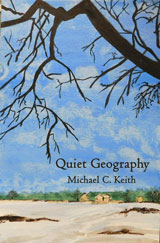
In a time when themed poetry collections are the rule, it is interesting and a little refreshing to read a
collection that could be titled simply Poems. In Michael Keith's collection of prose poems, Quiet Geography,
he has allowed himself to muse on all sorts of events, real or speculated. The book has a wide lens, which means each
poem has the power of a close-up.
One example of the more speculative sort of poem is "Past-Imperfect," where an ex-wife is troubled by her divorce.
"There's nothing good about being an ex-wife, she concludes, so she begins to plot how she might get her ex-husband
to remarry her." Her concern seems to be more a concern to do away with the "ex prefix" than it is to have her
ex-husband's love back. Her attempt fails, of course, and at the end she wonders if she'll remain an ex in the
grave. This is a simple example of complexity in a woman's life. It isn't presented as a judgement. There is
no hint as to why the divorce happened and the husband's expressed reason is empty. All we have is a wry look
at a woman's pain, which heightens with poem's tone.
Keith's sense of humor enriches these poems. In "Working Toward a Resolution" a customer finds a black hair under
his egg in a restaurant. When the waitress accuses him of putting the hair there to get a free breakfast,
the customer throws the plate. But his anger leaves him empty in more ways than one when the waitress brings
the plate back to him and declares that "there was no longer a black wavy hair under the egg." The short
paragraph is an entertaining chuckle that also leads the reader to wonder, where was the truth in the situation?
There are no answers presented.
There are nearly two hundred pages of prose poems in Quiet Geography. I could spend the next hours picking
our ones that are both amusing and thoughtful. Keith has a keen sense of humor, which is unfortunately not
something seen often enough in poetry in the recent years. But his sense of humor doesn't lead to some false
assumption that everything is a joke. The poems aren't jokes. They are the attempts of a poet who is well
aware of fear and hopelessness but is determined to make that clear without histrionics. I can't say reading
Quiet Geography will make you wiser, but it will give you the chance to see how wisdom can be done.
Gobbo: A Solitaire's Opera by David Cappella, 2022
Review by John Riley
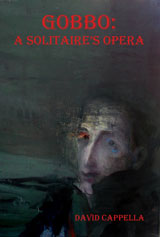
One of my great pleasure while reading Gobbo: A Solitaire's Opera is that I didn't know much about Giacomo Leopardi's
life before I started. I had vague memories of learning he suffered from a spinal disorder and that he was always in pain.
Thankfully, Cappella starts his book of sonnets with a short "Note to the Reader" that gives us a few lines about Leopardi
and that he wants his book to follow his emotional life but does not want to write a poetic autobiography. I have since
turned to translations of Leopardi's poems and am thankful for that.
Cappella's goal is clear from the beginning. In the first poem "Gobbo* remembers his youth" the footnote indicates that
"Gobbo" is the Italian word for hunchback. The first line of the poem is "Let me tell you about suffering," which
expresses the narrators state. It is a line that suggests we're about to read a volume of poetry full of self-pity,
but that is not what we receive. With lines such as "I would run to my mother with stones" we quickly learn we are
reading a poet's memory full of beauty combined with pain, both physical and emotional.
It is not difficult to wonder how being a "hunchback" would affect Gobbo's romantic life. In "Gobbo describes his
first love, the Contessa" he begins "Imagine this: a hunchback, dressed like priest" as he "lurks" at the Contessa
stepping from her carriage. Later in the sonnet "she stowed the knowledge of the hump ... behind soothing eyes."
The contrast between the romantic yearning of Gobbo and the Contessa's "soothing eyes," not romantic eyes, reveals
Gobbo's pain more than any lines of complaint could ever do.
There are so many poems to discuss I have to stop myself. I will say that the ending of the book not only covers
Gobbo's premature death. There are also Gobbo poems in which he takes a look at his life's work to discuss both his
strong and weak poems from his perspective. There is also a scholar who recalls him as young student. The book ends
with Gobbo's death from his point-of-view as well as others. In the last poem his mother speaks from the room in which
he was born. The first line begins with "He had been dead for years." That these words are coming from the mouth of
the mother Gobbo felt had not loved him is a moving and brilliant touch.
The book is written in sonnets that are sometimes metric and sometimes not. The fourteen-line form gives each poem its
own weight. The form allows for a regularity but is also the natural length for a thought or a scene or a remembrance.
The story of Gobbo flows naturally throughout. There are no crashes or high notes that would not fit such a narrative.
There is the strength of a consistent revealing of a poet's life as he works against physical and emotional challenges.
Even the language I'm using here is falling into therapy speak. Cappella avoids this by the clarity of the imagery as
well as the discourse, the avoidance on anachronistic speak, and the consistent use of a form.
Reading Gobbo: A Solitaire's Opera leaves one moved and wondering. We are able to visit both the inside and the outside
of a genius. What more could we want from a book of poems?

FOUNDLINGS: Found Poems from Prose
by DeWitt Henry
Review by Susan Isla Tepper
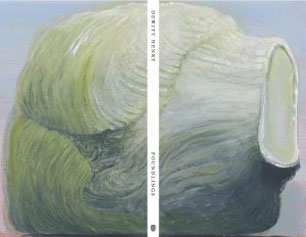
This book with its absence of print on both front and back covers intrigued me. A surreal picture of some form of
vegetation is what I perceived, what with its open end, perhaps like a wide mouth wailing from The Moors, though Henry
did not make a foundling of Othello. At the book's end it's attributed: COVER IMAGE: Lettuce No. 2, oil on copper,
25X20 cm, © Phil Day.
DeWitt Henry has made poems from these 'foundlings' which he has taken under his wing like you might take a forgotten
orphan, clean it up and add a little spice to the mix of its life.
Conceptually and artistically the concept is new to me. The book is inspiring and delightful. It returned me to
prose I'd read some time ago, with the addition of Henry's poetry to shore up his little 'foundlings'.
The range here is far reaching: Beginning with a poem constructed out of the prose of Adventure by Sherwood Anderson,
moving along to Alice Munro, Shakespeare, Isadora Duncan, Robert Coover, Raymond Carver, Shakespeare and many more.
As though the poetry of DeWitt Henry is doing a little dance through these eclectic prose writings.
A found poem in "Mrs. Bridge" by Evan S. Connell:
CLOCK
One fathomless instant
occurred on a windy, rainy night
when only she and her husband
remained at home...
For sometime they had been reading,
separately;
he had the financial page
of the newspaper and she
had been idly reading of the weddings.
With the newspaper in her lap, [she]
listened to the rumbling and booming
of thunder. Suddenly, in total quiet,
the room was illuminated.
[Her husband] lifted his head,
only that and nothing more.
"Did the clock strike?" he asked.
"No, I don't believe so."
He cleared his throat.
Adjusted his glasses.
Continued reading.
~~~
I found (no pun intended) the simplicity of this scene emotionally explosive because of what is not
said or actively revealed by Mrs. or Mr. Bridge. Henry's construct is clever and exciting.
I'm tempted to try a few foundlings, myself, at some point in time. Is there ever such a point?
We writers should grab the reins or the pen or pound the keyboard every day, before that day has
gone past and is lost forever. As perhaps many of these stories were before Henry breathed a
fresh puff of life into them.
Purchase link: https://gazebobooks.com.au/product/foundlings/
Gazebo BOOKS
Gazebobooks.com.au/life-before-man/

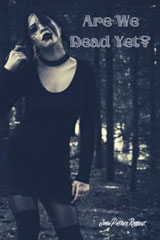
Are We Dead Yet? by John Patrick Robbins, 2022
Reviewed by Susan Isla Tepper
If this were music it would not be classified as Easy Listening. Poet John Patrick Robbins has taken each
piece of work in this collection straight to Ground Zero. Nobody gets a free pass and most especially not
the poet whose confessional style is one of the darkest I've ever come across. No rose-colored glasses for
Mister JPR or the invaders of his Lost Ark of life and subsequent after-life (whatever that might consist of
which is the search factor here).
This book offers mostly poems and includes three short stories in the mix. The longest of the stories,
titled A Deadly Game, could easily be expanded into a short novella, or even an experimental film.
Though it works perfectly as it's presented in the book. The plot, exotic and quite horrifying, is
nonetheless mesmerizing. And of course while the war in Ukraine rages on, people in real life are
having all sorts of terrible experiences for every reason imaginable. So, what I'm trying to get
across here, it that nothing between these covers is for the sake of sensationalism. This is pure
dark literary work from a writer deep in his craft.
A Deadly Game is set in France in The Sonian Forest. It's a chilling tale of contemporary life gone
totally awry due to the treacheries of world economics co-existing with personal power (on a somewhat
different note it also brought to mind the writings of the famous resistance fighter,
the writer Primo Levi, and his dangerous forests during World War 2).
An excerpt from A Deadly Game:
"Rachel knew any resistance at this point was beyond futile. Mr. Lavet... dealt in violence as easily as others
did breathe... As she removed the overcoat to reveal her naked body underneath, she knew there wasn't an ounce of
sexual desire amongst any of the men in this group. This was something on a sickening level only the elite could
fathom... Mr. Lavet approached Rachel, putting his fingers underneath her chin, tilting her head up, forcing
her to look him in the eyes. "The rules are simple: you run, we hunt. This forest is dense: it has been in
my family's possession for centuries. You escape it; you are free. And may I remind you, if you are so lucky
to escape, you will never speak of what happens here... Are we clear?"
The thematic cohesion throughout this book hits its mark every time. Like I said before it takes no prisoners.
A somewhat lighter approach on the theme:
Shooting Up With The Stars
I always dread the sunrise to chase away the peace and
silence of my nights spent alone.
Drinking with ghosts and destroying memories but never the
scars.
Sometimes we devolve as quickly as we grow.
As our hopes are buried with vices as lies embrace our
truths.
I am everything and nothing all the same.
I fully understand my insignificance in the not-so-great
order of things.
You never truly appreciate anything until it's gone.

When did you begin writing poems, Bill?
High school occasionally. Seriously in college. I won three writing competitions (two Academy of American Poets Prizes)
as an undergrad. Pretty much off and running ever since. 10,000 hours and counting. You didn't ask, but I published my
first book Pointed Sentences (BlazeVOX, 2012) when I was sixty.
What inspires you to write?
Words. Words and phrases. Sometimes a sentence. Infrequently a paragraph. Language used interestingly and well.
The juxtaposition of ill-fitting words. To quote Samuel Johnson, "The most heterogeneous"...[words] "are yoked by
violence together." Words inspire other words. The words attach themselves to events and ideas. Imagination
organizes the disorder.
You teach Film Study, Bill. Any favorite filmmakers?
Many, but I'm more interested in specific films than in filmmakers. Let me list some films-not all of my favorites
by any means, but films that are life-changing (at least they were for me): Michael Powell's I Know Where I'm Going,
Jean-Luc Godard's Pierrot le Fou, Federico Fellini's Nights of Cabiria, G. W. Pabst's Diary of a Lost Girl,
Carol Reed's The Third Man, Terry Zwigoff's Crumb, Josef von Sternberg's Docks of New York, Fred Niblo's
The Red Lily, Satyajit Ray's The Apu Trilogy, Vittorio de Sica's Umberto D, Robert Bresson's Pickpocket,
Roberto Rossellini's Europa '51, Ingmar Bergman's The Virgin Spring-to name only a few.
Any poets who inspire you?
Many, but I'm more interested in specific poems than in specific poets, and also in specific plays or prose works by
poets. Cowper's "The Castaway," Blake's The Marriage of Heaven and Hell, W.C. Williams' "To Elsie," Quevedo's
"Metaphysical Poem #2," Edward Lear's "The Jumblies," Thomas Middleton's The Changeling, Rilke's The Notebooks
of Malte Laurids Brigge, Ferlinghetti's Her, Baudelaire's Paris Spleen, Delmore Schwartz's In Dreams Begin
Responsibilities, Lorca's Yerma, Toomer's Cane, etc.
What interests you about Shakespeare's sonnets and plays?
His use of language. His understanding of psychology. His coherence. His understanding of shape. His ability to be
simple and straightforward when he wants to be. Like this beautiful line (uttered by France) about Cordelia:
"She is herself a dowry."
Could you tell us about any new publishings?
A poem here, a poem there. Finishing a manuscript called Critique of Pure Dreaming.
What are you working on now?
I've been making a lot of short films which I post to Vimeo [https://vimeo.com/showcase/8802414]
and to Tik Tok. Most of the films are two to three minutes long. I approach them as I approach my poems-using
small bits of public-domain films (I use them as I do words or phrases in my poems) and playing with them,
altering them, finessing them and stitching them together to form an artistic whole. That's where most of
my creative energy is going these days.
Could you tell us about Accelerant, one of your more recent works?
My latest full-length book is Accelerant, a book of forty poems from Nixes Mate Books. It came out in 2019 during AWP
in Portland. I'm not very good at talking about my books. I don't mind writing about other people's works, but I can't
quite stand far enough back from my work to write insightfully about it. The book was reviewed by Shelley Carpenter for
Toasted Cheese Literary Journal. I like what Shelley wrote about it, and I agree with her assessment:
For me, it was like each poem opened a door to an unseen space. I call it a twilight space. Unique and
sometimes unsettling, perhaps because it is partially recognizable. Yarrow evokes an idea and then he
populates it with intriguing elements, elegant and gritty.
Accelerant is an intrepid collection of gutsy poems. A pager turner in that each poem is unique in its structure,
voice, and message. For forty days, I read one of Yarrow's poems with my morning coffee and knew
with each visitation, I would be taken to a new place, down an interesting path, or a look back to a familiar
space seen through Bill Yarrow's very cool and penetrating perspective.
The poems in Accelerant don't share a theme or an approach or tell a coherent story. The book (like most of my books)
is an eclectic mix of subjects and styles. That is not to say I choose or order my poems willy-nilly. Emphatically not!
The book has a definite shape, but not one that I can define exactly. What used to be called "organic form," a
shape more felt than seen, more intuited than comprehended.
What's in the book? A couple of prose pieces ("The Whole Debt" and "Body Parts"), some very short poems
("Artefact," "Turbulence"), some longer pieces ("Poet Between Oxnard and Van Nuys," "Less Scenery"), a
new Cranshaw [a recurring character] poem ("Yuletide Cranshaw"), a number of poems that look like sonnets
but are just fourteen-line poems ("Sin Curve," "Sin Embargo," and "Pinochle in My Snout," among others),
some dialogue poems ("Neural Tones," "In the Time of the Breaking of Congratulations"), some structural
experiments ("Not a Villanelle," "Theorizing Salsa"). What else? A lot of jokes and puns,
[trigger warning: some vulgar]. A healthy dose of blasphemy. Nothing pretentious. Nothing predictable.
One poem in the volume, "A Pack of Matches," was very kindly republished in Verse Daily.
I had fun putting Accelerant together. To me, it's a fun book.
Thanks for asking about the book, John!

Poetry Spotlight on Erkut Tokman
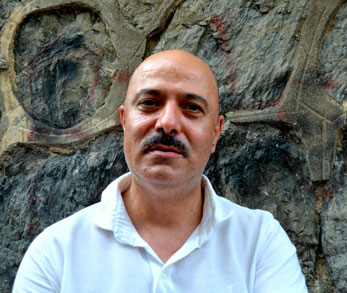
Erkut Tokman is a poet, editor, translator, visual artist and performer. He is member of The Poetry Society,
Exlied Writers Ink. of U.K, Turkey and Italy PEN Centers, and works for Writers in Prison Committee. He was
the president of International Poetry and Translation Academy of Turkey and the editor of well-known "Yasakmeyve,"
a poetry review of Istanbul. He is the author of five poetry books as well as five poetry translations. He
translated from Romanian and Italian over 80 contemporary and classical poets including Lucian Blage,
Nichita Stenescu, Mihai Eminescu, Guiseppe Ungaretti, Alda Merini, Franco Loi etc. His last poetry book "Lupoc" (2019)
triggered discussions on the Turkish poetry scene and receiving in return more than 20 articles and interviews.
He is the founder of Acik Siir poetry movement based on performance. He performed at Poetry Cafe-London,
Venice Borders Art Festival, LitVest-Timisoara and Izmir-Bi Nevi Sahne. He interviewed with Orhan Pamuk,
Adonis, Alice Notley, Joyce Carol Oates, Asli Erdogan, Milo De Angelis, Burhan Sonmez etc... and published
at leading international literary reviews such as World Literature Today (USA), Italian PEN Review,
The Poetry Review (U.K) to name a few. With his visual and digital art works, he was accepted as one of the
Archetypal Expressionism's artist. He was on the advisory board of "Roboski" Human-right's museum and gave
seminars at Bogazici and Mersin Universities on Poetry and Translation Arts. He received the
Messina Citta di Arte and Salvodor Quasimodo Jaci Poetry Awards and the Italian Ministery of
Culture Translation Award. He has lived in London, Milan and Bucharest for almost eight years in
total but currently lives between Istanbul and ?zmir.
BLOW
As broken in the spine of a pain
Is a mortal whose soul pregnant for a pray?
Man is a scarecrow to life
When he was born emptiness of a reason
Give me a silence from the time immemorial
Into quietness a rest
Give a breath back into the blue
A soul to whiteness,
Should World remain grey, polluted like this?
Be a voice of me
Into my voice a breath
Be it blow,
Blow the furthest from that time
through ancient and eternal,
gather the grapes of grief to the finest wine
nothing would be the same as casted before
blow the way the wind can't enter,
to fill in a space
Be breath, voice to those most beautiful moments
If we do not wake up in that hallucination
Once upon a time before this sleep
Remember we spilled over blood, not wine to World
To your silence, to your divine literature
All I whispered softly to the heart's cove
You that emptiness!
Incarnated in the unknown,
What is the cage to consciousness?
You now turn into silence and
Blow between the essence of being and non-existence
Erkut Tokman (Translated from Turkish by the author.)

Gene Barry passed away on September 19th, 2022
Next month, I will be writing about Gene. This is so sad.
My thoughts and prayers are with his wife Margo and their children. We all lost a wonderful person and
a great poet. I am so honored that he was a part of the press as a poetry reviewer.

Happy Holiday Season and Happy New Year from all of us at Cervena Barva Press.
Červená Barva Press Staff
Gloria Mindock, Editor & Publisher
Flavia Cosma, International Editor
Helene Cardona, Contributing Editor
Andrey Gritsman, Contributing Editor
Juri Talvet, Contributing Editor
Renuka Raghavan, Fiction Reviewer, Publicity
Karen Friedland, Interviewer
Gene Barry, Poetry Reviewer
Miriam O' Neal, Poetry Reviewer
Annie Pluto, Poetry Reviewer
Christopher Reilley, Poetry Reviewer
Susan Tepper, Poetry Reviewer
Neil Leadbeater, Poetry Reviewer
John Riley, Poetry and Fiction Reviewer
William J. Kelle, Webmaster
See you next month!


If you would like to be added to my monthly e-mail newsletter, which gives information on readings,
book signings, contests, workshops, and other related topics...
To subscribe to the newsletter send an email to:
newsletter@cervenabarvapress.com
with "newsletter" or "subscribe" in the subject line.
To unsubscribe from the newsletter send an email to:
unsubscribenewsletter@cervenabarvapress.com
with "unsubscribe" in the subject line.

Index |
Bookstore |
Our Staff |
Image Gallery |
Submissions |
Newsletter |
Readings |
Interviews |
Book Reviews |
Workshops |
Fundraising |
Contact |
Links
Copyright @ 2005-2023 ČERVENÁ BARVA PRESS - All
Rights Reserved
|

